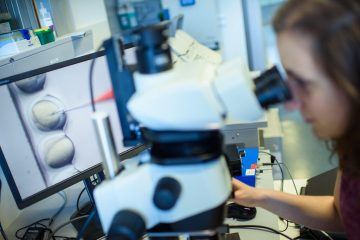Katherine Wu in The New York Times:
 A powerful gene-editing tool called Crispr-Cas9, which this month nabbed the Nobel Prize in Chemistry for two female scientists, can cause serious side effects in the cells of human embryos, prompting them to discard large chunks of their genetic material, a new study has found. Administered to cells to repair a mutation that can cause hereditary blindness, the Crispr-Cas9 technology appeared to wreak genetic havoc in about half the specimens that the researchers examined, according to a study published in the journal Cell on Thursday.
A powerful gene-editing tool called Crispr-Cas9, which this month nabbed the Nobel Prize in Chemistry for two female scientists, can cause serious side effects in the cells of human embryos, prompting them to discard large chunks of their genetic material, a new study has found. Administered to cells to repair a mutation that can cause hereditary blindness, the Crispr-Cas9 technology appeared to wreak genetic havoc in about half the specimens that the researchers examined, according to a study published in the journal Cell on Thursday.
The consequences of these errors can be quite serious in some cases, said Dieter Egli, a geneticist at Columbia University and an author of the study. Some cells were so flummoxed by the alterations that they simply gave up on trying to fix them, jettisoning entire chromosomes, the units into which human DNA is packaged, Dr. Egli said. “We’re often used to hearing about papers where Crispr is very successful,” said Nicole Kaplan, a geneticist at New York University who was not involved in the study. “But with the amount of power we hold” with this tool, Dr. Kaplan said, it is crucial “to understand consequences we didn’t intend.”
More here.
